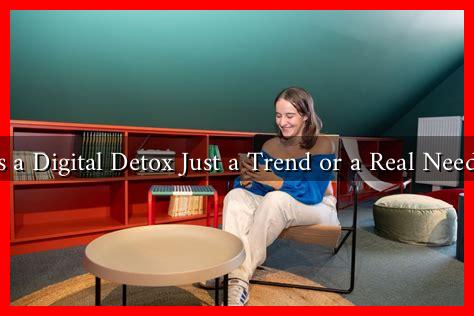-
Table of Contents
Is a Digital Detox Just a Trend or a Real Need?
In an age where technology permeates every aspect of our lives, the concept of a digital detox has gained significant traction. But is this phenomenon merely a passing trend, or does it address a genuine need in our increasingly connected world? This article explores the implications of constant connectivity, the benefits of a digital detox, and whether it is a necessity for mental and emotional well-being.
The Rise of Digital Overload
As of 2023, studies indicate that the average person spends over 7 hours a day on screens, whether for work, social media, or entertainment. This constant exposure can lead to a range of issues, including:
- Increased Anxiety: A study published in the journal *Computers in Human Behavior* found that excessive social media use correlates with heightened anxiety levels.
- Sleep Disruption: The blue light emitted by screens can interfere with sleep patterns, leading to insomnia and fatigue.
- Reduced Productivity: Multitasking between devices can decrease overall productivity by as much as 40%, according to research from the American Psychological Association.
These statistics highlight a growing concern: are we sacrificing our mental health and productivity at the altar of digital connectivity?
What is a Digital Detox?
A digital detox involves intentionally unplugging from digital devices for a set period. This can range from a few hours to several days, depending on individual needs and circumstances. The goal is to reduce screen time and reconnect with the physical world, fostering mindfulness and presence.
The Benefits of a Digital Detox
While some may view a digital detox as a trendy escape, numerous benefits support its necessity:
- Mental Clarity: Taking a break from screens can help clear mental clutter, allowing for improved focus and creativity.
- Enhanced Relationships: Spending quality time with family and friends without the distraction of devices can strengthen bonds and improve communication.
- Improved Physical Health: A digital detox encourages physical activity, whether through outdoor adventures or simply engaging in hobbies that don’t involve screens.
For instance, a case study conducted by the University of Pennsylvania found that participants who limited their social media use to 30 minutes a day reported significant reductions in feelings of loneliness and depression.
Is It Just a Trend? The Cultural Perspective
Critics argue that the digital detox movement is merely a trend fueled by social media influencers and wellness gurus. However, the increasing prevalence of mental health issues linked to technology suggests otherwise. The World Health Organization has recognized the impact of digital overload on mental health, indicating that the need for a digital detox is more than just a fad.
Moreover, companies are beginning to recognize the importance of digital well-being. For example, tech giants like Apple and Google have introduced features that allow users to monitor and limit their screen time, reflecting a growing awareness of the need for balance.
Practical Steps for a Successful Digital Detox
If you’re considering a digital detox, here are some practical steps to get started:
- Set Clear Goals: Determine how long you want to unplug and what you hope to achieve.
- Inform Others: Let friends and family know about your detox to manage expectations and reduce interruptions.
- Find Alternatives: Engage in activities that don’t involve screens, such as reading, hiking, or crafting.
- Reflect: Use this time to journal or meditate, helping you process your thoughts and feelings.
Conclusion: A Necessary Shift Towards Balance
In conclusion, while the digital detox may have gained popularity as a trend, its underlying necessity is evident. The mental and emotional toll of constant connectivity cannot be ignored. By taking the time to unplug, individuals can reclaim their mental clarity, improve relationships, and enhance overall well-being. As we navigate an increasingly digital world, embracing the concept of a digital detox may not just be beneficial—it may be essential for a balanced life.
For more insights on digital well-being, consider visiting World Health Organization.

